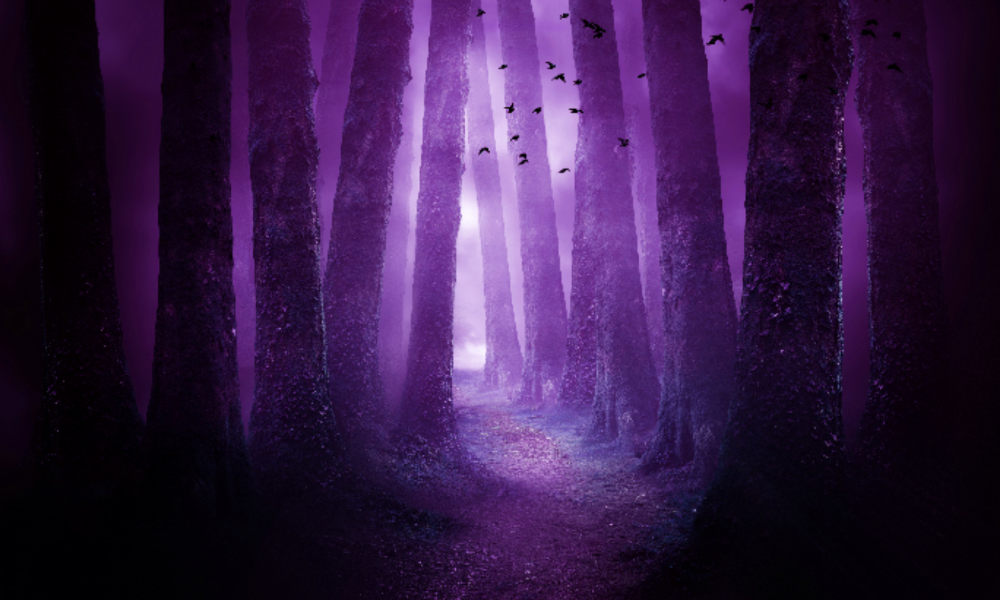Finalist in the 2020 Voyage YA Short Story Award
.
It is the kind of night where the wind keens in the rafters, so strong against the walls that the windows groan with it. The hearth is an oasis, even though the flames flicker like an omen. You hover over its warmth. Stew bubbles over the side of the pot hanging above; you run the ladle up, collecting it.
It is the witch’s wind, your mother said on a night like this, when she was still alive. Angry at a world that rejects her.
You stir the plot, slow. The room glows orange, like the edges of the leaves on your farm, like the pumpkins you gutted to make this stew, like your mother’s hair. The stew splashes. Slow, so it does not spill.
You feel your father’s presence like a weight on your back. What a good man, really, keeping watch over you even in your own home. The fire flickers again, again, and he clears his throat as it dims.
“Yes, father,” you say, and you dust your skirt off as you rise.
You fight with the door to open it against the storm, and the cold bowls into you, leaving you breathless. You keep your head down and push against it, toward the trees that stand like sentinels on the horizon. It is easier once you reach them. Quieter, too, but for the rustle of the leaves in the gale. Your feet keep moving, past the good firewood by the entrance, because something smells different in the woods tonight and your eyes are wide with it. When your feet have carried you far enough that your teeth chatter, you almost trip over a root and look up with a gasp. You have seen this tree before, but against the moon it holds a different quality; prouder and more ancient, with branches that stab into the sky and leaves that are a deep orange despite the early season. You would say you hate the color because your father told you to. As you gather twigs around the roots you have to remind yourself to keep your head down.
Something snaps, behind you, and you stare. You feel the presence before you see it: a figure outlined against the murk. Suddenly your confidence abandons you. The firewood anchors you, held close to your chest, and curiosity keeps your eyes wide and mouth open, wood-animal frozen. Then your father’s voice booms across the wood, and the spell is broken. You are running, but your foot easily twists in a gnarled root, and you scrape your knee open on the ancient tree. Air sucks in through your teeth. Your father calls, calls, and you snatch up the scattered firewood and limp away, only one glance cast back at the clearing, at your blood that gleams on the twisted root.
When you make your way out of the wood your father chastises you for your stupidity. You are not listening, though, not even when the fire roars back to life and the soup is served. Even when you lay in bed your eyes are wide, heart racing in your fingertips, and your eyes stare at the moon-washed forest. Your finger traces the spine of your mother’s russet diary, hidden beneath your pillow.
She had told you to be careful because you were too clever and too pretty. Unfortunate qualities in a girl—they drew too much attention. The witch hangs over you like a curse, then, because like all witches she is cruel and hungry and spurned by men, and she hunts girls like you. It must be true because you hear stories of girls taken from different villages, different worlds, all far lovelier and better behaved than you. You no longer complain of your discomfort. You smile when you want to scream.
When you come home the next day after tending to the animals, your father examines you with a sharp eye. It is the same, of course, when you go to the village together; you lower your head and keep your mouth closed. The ginger cobblestones stare back at you. Your father haggles for a wagon wheel and you feel his steel gaze burning into you. A good father, truly, to be so protective of his only daughter. When he turns to leave, you move like his shadow.
You remember what your mother taught you as a child, your mother, with the glossy hair and delicate hands. Modes of survival. You look more like your father, but you toss your hair and smile demurely all the same, hands kept folded on an unwrinkled skirt. You speak in a high, sweet voice only when addressed. So sweet, you could be, sweet as the flowers you collect for a garland, as the honeycomb you split with ungraceful hands. When your father is not paying attention, you slip into the woods and leave a chunk of it in the tangled roots of the old tree. It fills your mouth as you chew another on the way back, dusk sun scattering russet light along the underbrush.
Your mother had told you it was for your own good. She had chided it as she plaited your hair, as she smoothed your skirts. Be quiet, be small, be pleasant and polite. It makes you invisible. This is important, you learn as you read her diary in the moonlight, tracing over her delicate script. So very important.
You certainly feel invisible as you push the cart behind your father, who gathers the season’s harvest without even a glance your way. As you fashion it into a meal he eats in silence. He is lovely—such a hard worker, too fatigued to even acknowledge your presence. You count the seconds as he lingers in the sitting room, takes his time trudging up the stairs. By the time the moon is cradled between the branches of the forest, you are finally tucked away beneath them. It is easy, finding the tree, for you have taken this path many times now. Tonight your mother’s diary is tucked under your arm, and you don’t mind the chill, dressed warmly this time. The mushrooms around the base of the tree make the most delicious soup, and your father worries about you so gathering them during the day would be impossible. They are drawn lovingly on the pages, the red-caps, and the dirt gives easily beneath your insistent hands.
It is not long before the shadows around you gain substance, one that breaks twigs beneath its feet and moves along the underbrush. You watch it, entirely still, diary clutched to your chest. This time, your father is not here to rescue you.
The shadow steps out of the trees and gains value, planes of face and cloth and arm, and the blood roars in your ears louder than the thunder of your father’s voice. Your body snaps into motion and you scramble back, breath ragged, but the woman watches you with gentle, amused eyes. She is too pretty, unfairly pretty, this witch. The forest blurs beneath you as you flee, feet pounding against the leaves. You don’t stop until your bedroom door is firmly latched and even then you pant, your limbs trembling. Your father does not wake.
A week later you try again. Your father is out for the day, and as you feed the animals your eyes are fixed on the turning colors. On the grazing hill, you can see the old tree, blazing and regal among its subdued constituents, and it calls you. Before you can think, you are walking under the trees again, leaves crunching beneath your shoes. The forest is different in the midday sun. The witch looks different, too. When she emerges, the sun catches the edges of her curly hair. She is shockingly young—your age. Mirth twists the corner of her mouth, but her eyes are kind. She says, “Are you going to run away again?”
You try to speak but your mouth runs dry. There’s something wild about her despite her gentleness, and it keeps your jaw clamped shut. At your silence she turns and walks, deeper into the forest, and you unwittingly trail behind like a stray dog. She is humming a song under her breath, soft. You strain to hear the melody.
She takes you to a creek and sits at the edge of it, trousers rolled up to the knee. She whistles now, loud enough you can follow, but it is a strange song. You drink in her every movement—the easy slouch of her shoulders, the close-cropped hair she runs her fingers through. She dresses like the men of your village, you think, but far more handsome. Far more terrifying.
She points at a river stone nearby and it shoots up in the air, hovering. You gasp and stumble backward, and her laugh fills the grove, rough like a wolf. You cannot get enough air.
“You are her,” you breathe, and in her grin, you find something feral. It sets you on edge, heart racing.
“So you can speak,” she says and flicks the stone your way. You grab it out of the air. It is warm, and you feel the energy pulsating out of it. The sensible part of your brain screams at you to drop it. She smiles benevolently, but there is that animal edge to it now, one that makes your knees lock. Your name trips stupidly over your tongue. Moments later, you are sprinting back toward the house, but you are grinning the whole while.
It has been so long since you have had a companion. Your father does not let you leave his sight now, except when you tend to the animals, and the girls of your village did not seem to like you anyway. As soon as your tasks are finished and your father distracted, you are flying back to the woods, face split in a smile.
The witch is the most intriguing of consorts. A week after your first meeting, she tells you her name—Acantha—and it feels as powerful as the air that vibrates around her and raises the hair on your arms. Acantha. It whispers like the wind in the trees. You find yourself whispering it beneath your breath when you are alone, stone held close. It lives beside your mother’s diary now, beneath your pillow, two stolen treasures.
You feel like a little girl again, in the giddiness that fills your days. Acantha becomes your best-keep secret. She is beautiful, you decide, in a way that is uncomely. That’s what your mother called you when you tried to wear your father’s clothes, when you complained of the brush snagging in your hair. You wear her dresses now, a size too big. The hem drags along the floor. Acantha wears her uncomeliness like a second skin, freedom draped around her shoulders like a shawl. When you look at her your chest is tight with yearning, though you are not sure what for.
Sometimes your father notices your absence, the good, attentive man he is, and you ask him if he is doing all right in your sweetest voice. “Father dear, I’ve been in the fields the entire time.” He scratches his head and falls quiet. He has been sleeping more and remembering less these days, the poor man. He works so hard. Tonight, you make his favorite soup. Extra mushrooms.
It is fall now, well and truly, and the forest is on fire with it—the air is cold enough it stabs your lungs as you breathe in. The world is ocherous, amber, ginger, and it quickens your step. Furs bundle around your shoulders—your mother’s. They still smell faintly of her perfume, of the woman you cannot be. You gather berries now, the second set of hands making the task quick. When you prick your finger on a thorn, Acantha kisses the blood away, smiling. You are breathless, but she knows you did it on purpose. Your father remarks on the sweetness of the berries when you return with them, and your open face reveals nothing.
“It’s the time of year,” you say. “Good harvest.”
You start to think: Perhaps this is what the village girls feel. Perhaps you could understand their pining now, because whenever you think of Acantha your chest swells to bursting. She is decadent, like easing into bathwater. When she holds your hand she looks at you, dark eyes full, and your mind races with things that die before reaching your lips.
When you return home, you read your mother’s diary over a bowl of milk, and when your father drinks it that night he sleeps soundly through two days. You stay at home, observing. On the third morning, he plods down the stairs, and as you serve him breakfast you hum under your breath. That night you serve the milk to him again, and you hear him drop like a stone, bowl rolling to a stop against the door. It takes a while to pull him into bed, but an instant later you are outside.
Acantha waits for you at the edge of the forest, and she holds your hand as she pulls you through the woods. At last, to her little home, tucked away in the trees. The walls are orange. Her wolflike laugh fills the house as you cook with her, as you share every part of your mundane life. Her arms find their way around your waist and you remind yourself to breathe.
You sleep in her bed. When she pulls you to her, you find you fit so easily against her, as if your home were waiting to be discovered in the fit of her limbs. She smells like the woods, like cinnamon—it fills your senses. You watch her breathe long after she falls asleep. Her heart is slow and steady against your ear as you wait for your own to calm.
You rise before dawn, slip back into the fields just as the animals begin baying, click your tongue, and stroke them until they quiet. It is serene, watching the sun rise over the forest. Acantha’s scent still lingers in your dress.
When you arrive home your father is waiting, and he is not alone. You freeze in the doorway, terror shooting through your limbs so powerfully his words do not register. You’re so caught up you hear nothing until the word marriage, and the terror goes cold in your stomach. The man beside him is unremarkably handsome. You introduce yourself. You are the image of sweetness, of goodness. You pray they do not see the tremble in your limbs. You have played your role too well, the perfect daughter, and now you have a fiancé.
An afternoon is spent with them, interminable, and as the sun sets the man finally leaves. By the time the moon crowns the sky, you are pounding on Acantha’s door, and she pulls you inside and holds you until your shoulders stop shaking. Only once you calm does she take your hand and place in it a thin bronze ring.
“I have a plan,” she whispers, and her voice is as gentle as the fingers that linger in your palm. “But you must be patient.”
She looks at you with those dark eyes, beseeching, and all you can do is nod. You linger in her house for a long while, until all you can smell on your clothes is cinnamon. Your fiancé remarks on it the next day and is puzzled by the way you laugh. He is delightfully dull, you realize, the kind of man who likes to hear his own words reflected in yours. So you smile vapidly and laugh at all the right times, though it sounds harsh and artificial. He smiles daftly at you. You keep a hand in your pocket. Your thumb runs along the ring.
On the night of the wedding, you make a mushroom soup for your father and fiancé—father’s favorite, not yours. Your bowl remains unattended. You count your breaths, white knuckles aching against the grain of the table, until you finally hear the drop. Twin bodies on the floor. You pull the ring from your pocket and it glows. Your hands shake as you slide it on your finger. Quickly, quickly. The diary finds its way beneath your arm, from its place by the stove. And then you are running. The pages flap in the wind, and you are shouting, shouting, as the ring lights the way. Your stupid father. He never even glanced at the diary. Silly woman things, he thought, handed down from mother to daughter. A girl’s comfort. Yes, you think as you read from it, and the forest grows shut behind you. Silly woman things indeed.
Because your mother told you everything on her deathbed. She told you of the tree and the blood sacrifice and the honeycomb. She gave you her spellbook that shakes in your hands now. She was a witch once and never forgot it, not even when your father trapped her in your home until it killed her, just like he tried to do with you. You feel her blood burn bright in your veins under the harvest moon. You whoop, and you hear Acantha echo it back as you charge toward the river.
The water is shockingly cold as it hits your feet, and you laugh as you gasp, running, running. You lose your shoes in the muck, and your toes sink into it. You are loud, but you do not care, twisting in your dress until you are finally free of the wretched thing. A selkie returning to sea. Acantha was catching up now, the witch, your love, and her laugh echoes, that wonderful wolflike sound. The moon scatters as you tear through its reflection. You are free, and free, and free, and it tastes orange. Orange, like your hair as it falls unbound at last around your shoulders, like the shirt Acantha tears off as she runs after you, her voice the peal of a bell. Your favorite color. When she catches up and kisses you, at last, it is as warm as the leaves that still cling stubborn to their branches. You cling to her just the same as she leads you deep into the woods, and you follow her to your homecoming.




